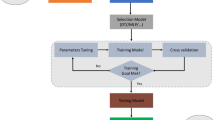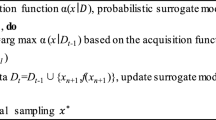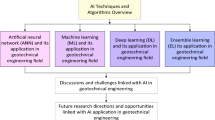Abstract
This paper aims to develop a novel prediction tool based on the machine learning framework to evaluate the compressive strength and effective porosity of pervious concrete material from its compositions. To address this difficult task, 14 data sources were collected from the literature to build a dataset of 164 samples. The dataset included seven mixture design features (e.g., aggregate-to-cement ratio, water-to-cement ratio, minimum coarse aggregate size, the presence of sand or silica fume, effective porosity, and the compressive strength). This dataset was trained and tested by the most relevant machine learning methods: the extreme gradient boosting method (XGB), the random forest regression method, and the support vector machine method. The Particle Swarm Optimization method was applied to tune the models’ hyperparameters. It was observed that the extreme gradient boosting method significantly outperformed the accuracy of the other methods. Relatively high R-squared values of 0.92 and 0.88 were obtained for the compressive strength and effective porosity predictions. Furthermore, to account for the role of compaction, the original database was refined to obtain a 36 samples subset that considered compaction energy. Based on our assessment of this subset, results yielded superior R-squared values up to 0.99 for compressive strength, and 0.97 for effective porosity, revealing the effectiveness and accuracy of this research.
Similar content being viewed by others
References
ACI 522-R10 (2010) 522-R10: ACI 522 Committee Report Adewumi AA, Owolabi TO, Alade IO, Olatunji SO (2016) Estimation of physical, mechanical and hydrological properties of permeable concrete using computational intelligence approach. Applied Soft Computing 42:342–350, DOI: https://doi.org/10.1016/j.asoc.2016.02.009
Asadi S, Hassan MM, Kevern JT, Rupnow TD (2012) Development of photocatalytic pervious concrete pavement for air and storm water Improvements. Transportation Research Record: Journal of the Transportation Research Board 2290:161–167, DOI: https://doi.org/10.3141/2290-21
Aslam F, Farooq F, Amin MN, Khan K, Waheed A, Akbar A, Javed MF, Alyousef R, Alabdulijabbar H (2020) Applications of gene expression programming for estimating compressive strength of high-strength concrete. Advances in Civil Engineering 2020, DOI: https://doi.org/10.1155/2020/8850535
Bock FE, Aydin RC, Cyron CJ, Huber N, Kalidindi SR, Klusemann B (2019) A review of the application of machine learning and data mining approaches in continuum materials mechanics. Frontiers in Materials 6, DOI: https://doi.org/10.3389/fmats.2019.00110
Bohdan S, Tomasz K (2013) Determination of the influence of cylindrical samples dimensions on the evaluation of concrete and wall mortar strength using ultrasound method. Procedia Engineering 57:1078–1085, DOI: https://doi.org/10.1016/j.proeng.2013.04.136
Breiman L (2001) Random forests. Machine Learning 45:5–32, DOI: https://doi.org/10.1023/A:1010933404324
Chaabene WB, Flah M, Nehdi ML (2020) Machine learning prediction of mechanical properties of concrete: Critical review. Construction and Building Materials 260:119889, DOI: https://doi.org/10.1016/j.conbuildmat.2020.119889
Chandrappa AK, Biligiri KP (2016) Pervious concrete as a sustainable pavement material — Research findings and future prospects: A state-of-the-art review. Construction and Building Materials 111: 262–274, DOI: https://doi.org/10.1016/j.conbuildmat.2016.02.054
Chen T, Guestrin C (2016) Xgboost: A scalable tree boosting system. Proceedings of the 22nd ACM SIGKDD International Conference on Knowledge Discovery and Data Mining, August 13–17, San Francisco, California, USA 785–794, DOI: https://doi.org/10.1145/2939672.2939785
Chen X, Ishwaran H (2012) Random forests for genomic data analysis. Genomics 99:323–329, DOI: https://doi.org/10.1016/j.ygeno.2012.04.003
Crouch LK, Pitt J, Hewitt R (2007) Aggregate effects on pervious portland cement concrete static modulus of elasticity. Journal of Materials in Civil Engineering 19:561–568, DOI: https://doi.org/10.1061/(ASCE)0899-1561(2007)19:7(561)
Dean SW, Kevern JT, Schaefer VR, Wang K, Suleiman MT (2008) Pervious concrete mixture proportions for improved freeze-thaw durability. Journal of ASTM International 5:101320, DOI: https://doi.org/10.1520/JAI101320
Deo O, Neithalath N (2011) Compressive response of pervious concretes proportioned for desired porosities. Construction and Building Materials 25:4181–4189, DOI: https://doi.org/10.1016/j.conbuildmat.2011.04.055
Deshpande N, Londhe S, Kulkarni S (2014) Modeling compressive strength of recycled aggregate concrete by Artificial Neural Network, Model Tree and Non-linear Regression. International Journal of Susstainable Built Environment 3:187–198, DOI: https://doi.org/10.1016/j.ijsbe.2014.12.002
Du X, Jin L, Ma G (2013) Macroscopic effective mechanical properties of porous dry concrete. Cement and Concrete Research 44:87–96, DOI: https://doi.org/10.1016/j.cemconres.2012.10.012
Duan J, Asteris PG, Nguyen H, Bui X-N, Moayedi H (2020) A novel artificial intelligence technique to predict compressive strength of recycled aggregate concrete using ICA-XGBoost model. Engineering with Computers 1–18, DOI: https://doi.org/10.1007/s00366-020-01003-0
Elango K, Revathi V (2017) Fal-G Binder pervious concrete. Construction and Building Materials 140:91–99, DOI: https://doi.org/10.1016/j.conbuildmat.2017.02.086
Farooq F, Ahmed W, Akbar A, Aslam F, Alyousef R (2021a) Predictive modeling for sustainable high-performance concrete from industrial wastes: A comparison and optimization of models using ensemble learners. Journal of Cleaner Production 292:126032, DOI: https://doi.org/10.1016/j.jclepro.2021.126032
Farooq F, Czarnecki S, Niewiadomski P, Aslam F, Alabduljabbar H, Ostrowski KA, Sliwa-Wieczorek K, Nowobilski T, Malazdrewicz S (2021b) A comparative study for the prediction of the compressive strength of self-compacting concrete modified with fly ash. Materials (Basel, Switzerland) 14:4934, DOI: https://doi.org/10.3390/ma14174934
Farooq F, Nasir Amin M, Khan K, Rehan Sadiq M, Faisal Javed M, Aslam F, Alyousef R (2020) A comparative study of random forest and genetic engineering programming for the prediction of compressive strength of high strength concrete (HSC). Applied Sciences 10:7330, DOI: https://doi.org/10.3390/app10207330
Ferguson B (2005) Porous pavements. CRC Press, Florida, USA
Friedman J (2000) Greedy function approximation: A gradient boosting machine. The Annals of Statistics 29, DOI: https://doi.org/10.1214/aos/1013203451
Ghaboussi J, Garrett JH, Wu X (1991) Knowledge-based modeling of material behavior with Neural Networks. Journal of Engineering Mechanics 117:132–153, DOI: https://doi.org/10.1061/(ASCE)0733-9399(1991)117:1(132)
Gholampour A, Gandomi AH, Ozbakkaloglu T (2017) New formulations for mechanical properties of recycled aggregate concrete using gene expression programming. Construction and Building Materials 130:122–145, DOI: https://doi.org/10.1016/j.conbuildmat.2016.10.114
Golafshani EM, Behnood A, Arashpour M (2020) Predicting the compressive strength of normal and High-Performance Concretes using ANN and ANFIS hybridized with Grey Wolf Optimizer. Construction and Building Materials 232:117266, DOI: https://doi.org/10.1016/j.conbuildmat.2019.117266
Han T, Siddique A, Khayat K, Huang J, Kumar A (2020) An ensemble machine learning approach for prediction and optimization of modulus of elasticity of recycled aggregate concrete. Construction and Building Materials 244:118271, DOI: https://doi.org/10.1016/j.conbuildmat.2020.118271
Hung VV, Seo S-Y, Kim H-W, Lee G-C (2021) Permeability and strength of pervious concrete according to aggregate size and blocking material. Sustainability 13, DOI: https://doi.org/10.3390/su13010426
Ibrahim A, Mahmoud E, Yamin M, Patibandla VC (2014) Experimental study on Portland cement pervious concrete mechanical and hydrological properties. Construction and Building Materials 50:524–529, DOI: https://doi.org/10.1016/j.conbuildmat.2013.09.022
Ilyas I, Zafar A, Javed MF, Farooq F, Aslam F, Musarat MA, Vatin NI (2021) Forecasting strength of CFRP confined concrete using multi expression programming. Materials 14:7134, DOI: https://doi.org/10.3390/ma14237134
Javed MF, Amin MN, Shah MI, Khan K, Iftikhar B, Farooq F, Aslam F, Alyousef R, Alabduljabbar H (2020) Applications of gene expression programming and regression techniques for estimating compressive strength of bagasse ash based concrete. Crystals 10:737, DOI: https://doi.org/10.3390/cryst10090737
Kennedy J, Eberhart R (1995) Particle swarm optimization. Proceedings of ICNN’95 — International Conference on Neural Networks (pp. 1942–1948 vol.4). volume 4, November 27–December 01, Perth, WA, Australia, DOI: https://doi.org/10.1109/ICNN.1995.488968
Kevern J, Schaefer V, Wang K, Suleiman M (2008) Pervious concrete mixture proportions for improved freeze-thaw durability. Journal of ASTM International 5:1–12, DOI: https://doi.org/10.1520/JAI101320
Kia A, Wong HS, Cheeseman CR (2017) Clogging in permeable concrete: A review. Journal of Environmental Management 193:221–233, DOI: https://doi.org/10.1016/j.jenvman.2017.02.018
Le BA, Yvonnet J, He Q-C (2015) Computational homogenization of nonlinear elastic materials using neural networks. International Journal for Numerical Methods in Engineering 104:1061–1084, DOI: https://doi.org/10.1002/nme.4953
Li D, Li Z, Lv C, Zhang Q Yin Y (2018) A predictive model of the effective tensile and compressive strengths of concrete considering porosity and pore size. Construction and Building Materials 170: 520–526, DOI: https://doi.org/10.1016/j.conbuildmat.2018.03.028
Lian C, Zhuge Y, Beecham S (2011) The relationship between porosity and strength for porous concrete. Construction and Building Materials 25:4294–4298, DOI: https://doi.org/10.1016/j.conbuildmat.2011.05.005
Mullaney J, Lucke T (2014) Practical review of pervious pavement designs. CLEAN — Soil, Air, Water 42:111–124, DOI: https://doi.org/10.1002/clen.201300118
Nafees A, Javed MF, Khan S, Nazir K, Farooq F, Aslam F, Musarat MA, Vatin NI (2021) Predictive modeling of mechanical properties of silica fume-based green concrete using artificial intelligence approaches: MLPNN, ANFIS, and GEP. Materials 14:7531, DOI: https://doi.org/10.3390/ma14247531
Nguyen H-Q, Tran B-V, Vu T-S (2022) Numerical approach to predict the flexural damage behavior of pervious concrete. Case Studies in Construction Materials 16:e00946, DOI: https://doi.org/10.1016/j.cscm.2022.e00946
Nguyen-Sy T, Vu M-N, Tran-Le A-D, Tran B-V, Nguyen T-T-N, Nguyen T-T (2020a) Studying petrophysical properties of micritic limestones using machine learning methods. Journal of Applied Geophysics, 104226, DOI: https://doi.org/10.1016/j.jappgeo.2020.104226
Nguyen-Sy T, Wakim J, To Q-D, Vu M-N, Nguyen T-D, Nguyen T-T (2020b) Predicting the compressive strength of concrete from its compositions and age using the extreme gradient boosting method. Construction and Building Materials 260:119757, DOI: https://doi.org/10.1016/j.conbuildmat.2020.119757
Oey T, Jones S, Bullard JW, Sant G (2020) Machine learning can predict setting behavior and strength evolution of hydrating cement systems. Journal of the American Ceramic Society 103:480–490, DOI: https://doi.org/10.1111/jace.16706
Rezaei Lori A, Bayat A, Azimi A (2019) Influence of the replacement of fine copper slag aggregate on physical properties and abrasion resistance of pervious concrete. Road Materials and Pavement Design 1–17, DOI: https://doi.org/10.1080/14680629.2019.1648311
Rumelhart DE, Hinton GE, Williams RJ (1986) Learning representations by back-propagating errors. Nature 323:533–536, DOI: https://doi.org/10.1038/323533a0
Saboo N, Shivhare S, Kori KK, Chandrappa AK (2019) Effect of fly ash and metakaolin on pervious concrete properties. Construction and Building Materials 223:322–328, DOI: https://doi.org/10.1016/j.conbuildmat.2019.06.185
Salimbahrami SR, Shakeri R (2021) Experimental investigation and comparative machine-learning prediction of compressive strength of recycled aggregate concrete. Soft Computing 25:919–932, DOI: https://doi.org/10.1007/s00500-021-05571-1
Shu X, Huang B, Wu H, Dong Q, Burdette EG (2011) Performance comparison of laboratory and field produced pervious concrete mixtures. Construction and Building Materials 25:3187–3192, DOI: https://doi.org/10.1016/j.conbuildmat.2011.03.002
Singh A, Sampath PV, Biligiri KP (2020) A review of sustainable pervious concrete systems: Emphasis on clogging material characterization and environmental aspects. Construction and Building Materials 261:120491, DOI: https://doi.org/10.1016/j.conbuildmat.2020.120491
Singh R, Goel S (2019) Pervious concrete — A review on its properties and applications. In A. K. Agnihotri K. Reddy A. Bansal (Eds.) Sustainable Engineering 157–165, DOI: https://doi.org/10.1007/978-981-13-6717-5_16
Sumanasooriya MS, Neithalath N (2011) Pore structure features of pervious concretes proportioned for desired porosities and their performance prediction. Cement and Concrete Composites 33:778–787, DOI: https://doi.org/10.1016/j.cemconcomp.2011.06.002
Sumanasooriya MS, Bentz DP, Neithalath N (2010) Planar image-based reconstruction of pervious concrete pore structure and permeability prediction. ACI Materials Journal 107, DOI: https://doi.org/10.14359/51663868
Sumanasooriya MS, Deo O, Neithalath N (2012) Particle packing-based material design methodology for pervious concretes. Materials Journal 109:205–214, DOI: https://doi.org/10.14359/51683707
Sun J, Zhang J, Gu Y, Huang Y, Sun Y, Ma G (2019) Prediction of permeability and unconfined compressive strength of pervious concrete using evolved support vector regression. Construction and Building Materials 207:440–449, DOI: https://doi.org/10.1016/j.conbuildmat.2019.02.117
Svetnik V, Liaw A, Tong C, Culberson JC, Sheridan RP, Feuston BP (2003) Random forest: A classification and regression tool for compound classification and qsar modeling. Journal of Chemical Information and Computer Sciences 43:1947–1958, DOI: https://doi.org/10.1021/ci034160g
Vu V-H, Tran B-V, Le B-A, Nguyen H-Q (2021) Prediction of the relationship between strength and porosity of pervious concrete: A micromechanical investigation. Mechanics Research Communications 103791, DOI: https://doi.org/10.1016/j.mechrescom.2021.103791
Wang H, Li H, Liang X, Zhou H, Xie N, Dai Z (2019) Investigation on the mechanical properties and environmental impacts of pervious concrete containing fly ash based on the cement-aggregate ratio. Construction and Building Materials 202:387–395, DOI: https://doi.org/10.1016/j.conbuildmat.2019.01.044
Wang K, Schaefer V, Kevern J, Suleiman M (2006) Development of mix proportion for functional and durable pervious concrete. Proceedings of the NRMCA concrete technology forum: Focus on Pervious Concrete 1–12, May 24–25, Nashville, TN, USA
Xie X, Zhang T, Wang C, Yang Y, Bogush A, Khayrulina E, Huang Z, Wei J, Yu Q (2020) Mixture proportion design of pervious concrete based on the relationships between fundamental properties and skeleton structures. Cement and Concrete Composites 113:103693, DOI: https://doi.org/10.1016/j.cemconcomp.2020.103693
Yeh IC (1998) Modeling of strength of high-performance concrete using artificial neural networks. Cement and Concrete Research 28:1797–1808, DOI: https://doi.org/10.1016/S0008-8846(98)00165-3
Yeih W, Chang JJ (2019) The influences of cement type and curing condition on properties of pervious concrete made with electric arc furnace slag as aggregates. Construction and Building Materials 197:813–820, DOI: https://doi.org/10.1016/j.conbuildmat.2018.08.178
Yu F, Sun D, Hu M, Wang J (2019) Study on the pores characteristics and permeability simulation of pervious concrete based on 2D/3D CT images. Construction and Building Materials 200:687–702, DOI: https://doi.org/10.1016/j.conbuildmat.2018.12.135
Z.H. Duan Kou S, Poon C (2013) Prediction of compressive strength of recycled aggregate concrete using artificial neural networks. Construction and Building Materials 40:1200–1206, DOI: https://doi.org/10.1016/j.conbuildmat.2012.04.063
Zhang J, Huang Y, Ma G, Sun J, Nener B (2020a) A metaheuristic-optimized multi-output model for predicting multiple properties of pervious concrete. Construction and Building Materials 249:118803, DOI: https://doi.org/10.1016/j.conbuildmat.2020.118803
Zhang J, Huang Y, Wang Y, Ma G (2020b) Multi-objective optimization of concrete mixture proportions using machine learning and metaheuristic algorithms. Construction and Building Materials 253:119208, DOI: https://doi.org/10.1016/j.conbuildmat.2020.119208
Zhong R, Leng Z, Poon C-s (2018) Research and application of pervious concrete as a sustainable pavement material: A state-of-the-art and state-of-the-practice review. Construction and Building Materials 183:544–553, DOI: https://doi.org/10.1016/j.conbuildmat.2018.06.131
Zhong R, Wille K (2016) Compression response of normal and high strength pervious concrete. Construction and Building Materials 109:177–187, DOI: https://doi.org/10.1016/j.conbuildmat.2016.01.051
Zhou H, Li H, Abdelhady A, Liang X, Wang H, Yang B (2019) Experimental investigation on the effect of pore characteristics on clogging risk of pervious concrete based on CT scanning. Construction and Building Materials 212:130–139, DOI: https://doi.org/10.1016/j.conbuildmat.2019.03.310
Acknowledgments
This research is funded by University of Transport and Communications (UTC) under grant number T2022-CT-005.
Author information
Authors and Affiliations
Corresponding author
Rights and permissions
About this article
Cite this article
Le, BA., Vu, VH., Seo, SY. et al. Predicting the Compressive Strength and the Effective Porosity of Pervious Concrete Using Machine Learning Methods. KSCE J Civ Eng 26, 4664–4679 (2022). https://doi.org/10.1007/s12205-022-1918-z
Received:
Revised:
Accepted:
Published:
Issue Date:
DOI: https://doi.org/10.1007/s12205-022-1918-z




